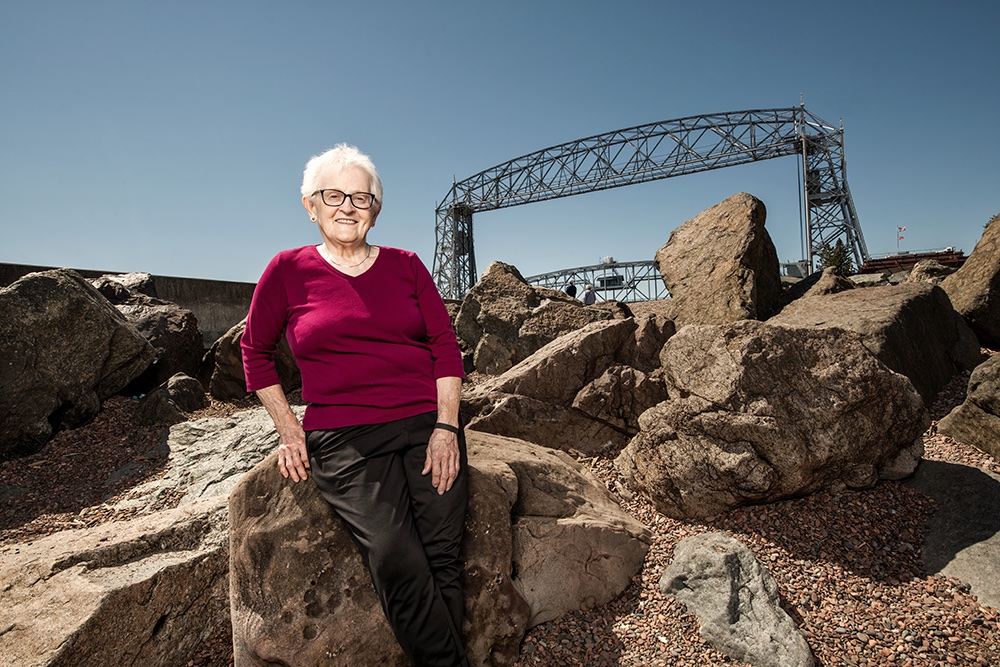For Jude Collins, life is an attitude. Hers has been spent largely in the service of others — as an Army veteran, a college professor, a pastoral assistant, a hospital chaplain, and a creator of handcrafted woodwork, to name a few roles. Being active and purpose-driven has helped the 79-year-old Duluth resident and Blue Cross member stay healthy in both mind and body.
“I think the purpose of life is to live it in healthy, balanced ways,” Collins says.“And to remember that we belong to a community and we’re here to help each other. If we don’t help each other, why are we here?”
“Purpose in life” is commonly described as having a sense of direction or goals — doing something that adds meaning to your life or maintains connections to others. Living with purpose is important for our health and wellness in a number of ways. It’s been shown to lower risk of chronic conditions and disabilities, as well as brain disorders, such as Alzheimer’s disease. Some studies have even shown a link to longer life.
The reality, however, is that maintaining meaning in our lives can prove more challenging as we age. With children raised, careers complete and, sometimes, favorite activities becoming more challenging to do, some older adults might feel as though their identity — and purpose — is unclear. But it’s never too late to discover new passions and improve your health and well-being along the way.
Finding purpose in passion
“I think it’s important to have passion for something, no matter how trivial it seems to others,” says Dr. Denise Park, distinguished professor of brain and behavioral sciences at the University of Texas at Dallas. “Purpose is passion. To find purpose, you have to care about what you do.”
As a cognitive psychologist, Dr. Park has spent her entire career studying how age affects the brain. Part of that research includes how an engaging lifestyle, one that creates a sense of purpose, impacts brain activity. In one of her studies, she found that a group of adults age 60 to 90 who learned and practiced quilting and photography developed a strong sense of purpose and brain benefits. The participants took part in their activities for 15 hours a week over three months, resulting in a lasting boost in memory, attention and other brain functions.
Purpose-driven activities can range widely; spending time with grandchildren, partner dancing, creating artwork, playing chess, or volunteering at the local food shelf are just a few examples. Regardless of the activity, Dr. Park suggests exploring what you find fun. Social connectedness can also play a role, she says. Involving others and sharing achievements builds motivation and a greater sense of accomplishment.
“That’s not to say it’s impossible to find purpose doing things on your own. A lot of the hardest tasks that people have performed, they did alone,” Dr. Park says. “But it can be challenging because you don’t get a lot of validation that what you’re doing is worthwhile. Even if you have one other person who believes in you and what you’re doing, it can make all the difference.”
Staying connected and living purposefully are also important for avoiding social isolation, which can increase the risk for mood disorders, such as depression, and lead to other health problems.
“If you don’t feel you have a purpose, you are more likely to be depressed,” says Dr. Richard Kinnier, a retired professor of counseling psychology at Arizona State University. “And if you’re depressed, you are more likely not to take care of yourself.”
That might mean poor lifestyle choices, such as an unhealthy diet, lack of exercise, alcohol abuse, or taking more risks than you might otherwise.
“Living with purpose is absolutely an important component to both mental and physical health,” Dr. Kinnier says.
Building better lives
Collins finds joy in helping others and using her multiple talents to create things or make them better. Those passions have persisted throughout her life and often go hand-in-hand.
After teaching high school in a small Wisconsin town for four years, she joined the Army and spent a couple of years training enlisted women. She served another decade in the Army Reserves before becoming a pastoral assistant in Superior, Wisconsin, and later a corrections and hospital chaplain. She eventually started working part- time at Lake Superior College, transitioning to full-time as a psychology professor before retiring about 11 years ago.
At age 67, she wasn’t ready to slow down. Using woodworking skills she learned from her father, she launched her own business making caskets and urn boxes, something her grandfather used to do. She has since moved on from that business, but uses her skills for fun, whether it’s for home improvement, yard decorations,
or making things for friends. She also spends much of her time volunteering with her local church, “up to her elbows in dirt” in her garden, and helping out neighbors.
When one of Collins’ neighbors was having trouble deciding what to do with their yard recently, she rolled up her sleeves and did some landscaping — an easy way to add purpose to her day.
“It’s very satisfying to see the work and the expression on their faces when they see it,” she says. “I had extra plants, I had the tools to do it. I had the energy and the desire. Everybody wins.”
Collins says she’s never been an athlete. She attributes her strong health to her active lifestyle, doing her best to eat balanced meals, and being proactive about her health.
“To protect your health, you have got to be actively engaged in your health,” Collins says. “I know I’m never going to be 23 again, but there are things I can do at 79. I can watch what I eat, I can exercise, I can have good close friends.”
More than anything, she just wants to leave a positive mark on the world, something she suggests anyone, at any age, can do.
“I believe we have to leave the world better than when we came into it,” she says. “I think we owe that to the world and everyone that’s in it. And if you can do good, why would you not?”


